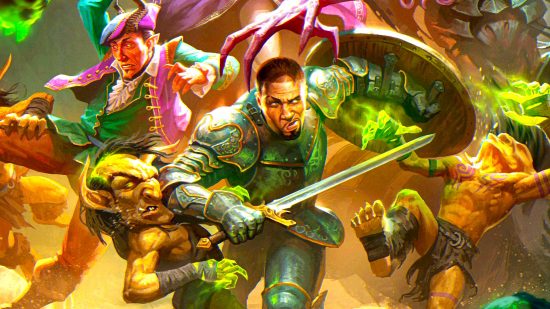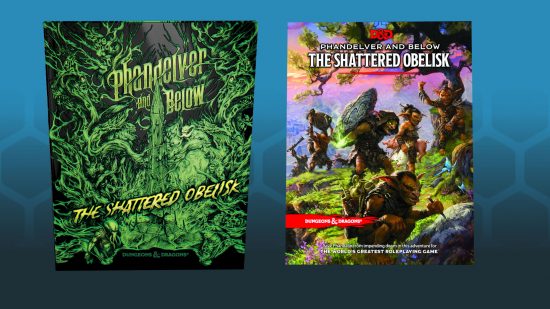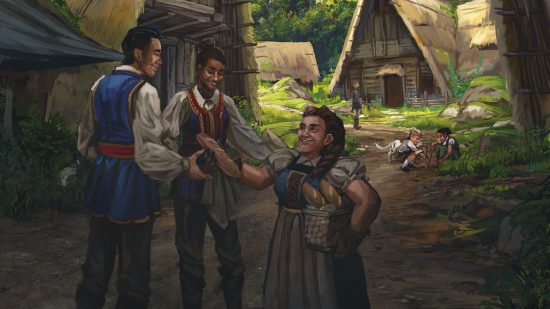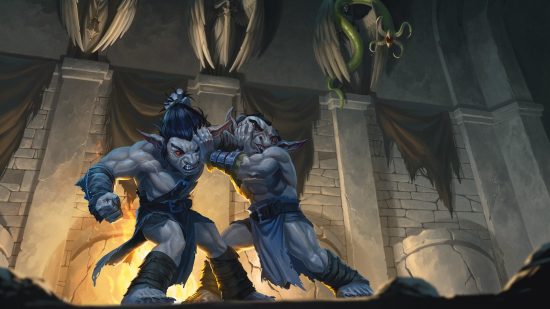Our Verdict
Like watching a Mind Flayer munch on a brain, Phandelver and Below can be a little messy. But whether you’re new to D&D or a well-known face around Phandalin, we reckon this is a 5e adventure worth picking up. Unless you happen to be squeamish, that is.
It’s been a long time since we visited Phandalin. Once the setting for D&D 5e’s first starter set, it’s now being introduced to a new generation of players in Phandelver and Below: The Shattered Obelisk. The borders of the adventure have now been expanded, and with the extra player levels comes a crueller, cosmic horror campaign that transforms the Phandalin we once knew.
Thanks to a complimentary copy from Wizards of the Coast, we had a chance to conduct a Phandelver and Below review. After a thorough readthrough, the verdict is this: Phandalin’s transformation is by no means seamless, but its new form is well worth exploring if you’re an adventurer who doesn’t mind a bit of squishy body horror.
What is Phandelver and Below?
Phandelver and Below: The Shattered Obelisk is a DnD campaign designed for four to six players. Players begin a familiar dungeon-crawling adventure at level one, and they’ll face a crisis of unexpected scale (and weirdness) by the time they reach level 12.
Its first four chapters are a remaster of Lost Mines of Phandelver, a beginner-friendly adventure that was part of the original 2014 D&D starter set. After a simple delivery gone wrong, players must explore the town of Phandalin – and the titular Mines of Phandelver – to thwart plots that threaten the idyllic and welcoming town.
While the core quests remain the same, tweaks have been made all over. This includes rewritten flavor text, adjusted 5e encounters, and NPCs with swapped genders.
Once you reach chapter five, however, it’s all new content – and all feelings of familiarity go out the window. An entirely new threat emerges from Phandalin, and the traditional fantasy dungeon crawl becomes infected, warping into a cosmic horror encounter with twists that are both unusual and more than a little grotesque. Mind Flayers are officially back on the menu.
Who is Phandelver and Below for?
It goes without saying that Phandelver and Below has appeal for fans of the original starter set. This is a chance to relive what might have been your first-ever D&D adventure, after all. Many of the tweaks are cosmetic or focus on moving Phandelver on from its starter set status, removing the more obvious DM advice – but the heart of the campaign remains.
There appears to be another audience Wizards of the Coast was trying to capture, though – Baldur’s Gate 3 fans. A huge number of DnD monsters, DnD gods, and organizations mentioned in the videogame feature in Phandelver and Below. Plus, the early chapters of the campaign still use beginner-friendly language, making this an appropriate jumping-on point for CRPG fans who want to try D&D.

At least, that’s true in the first half. Phandelver and Below gives inconsistent support for DMs throughout, sometimes offering copious amounts of hand-holding, and other times expecting a veteran level of DMing knowledge.
The book begins by explaining the basics of character creation, but later on you’ll be expected to know how to create your own combat encounters with almost no guidance. There’s a range of NPCs, quests, and time-based events to manage, but the tools and tips you’re given to track such complexity are fairly vague.
Based on how the book was marketed, this isn’t too much of a surprise. An early press event revealed the designers aged-up the campaign, taking away its family-friendly reputation and aiming it more towards experienced players. However, Phandelver doesn’t really commit to being entirely one thing – beginner-friendly or streamlined for long-time players.
Is Phandelver and Below good or bad?
This dual identity affects the adventure’s content too. Phandelver and Below is trying hard to be two different adventures at once, and the ties between them are pretty weak. A strange goblin is mentioned here and there in the remastered first half, but there’s no other lead-up to what’s coming next.
This at times gives the adventure a conflicting tone, and the transition from one section of the book to the next is rocky. Phandelver’s second half is a horror-heavy race against time, so it felt odd to have the book suggest a series of loosely relevant, investigation-based side quests in Phandalin at the book’s mid-point, for example.
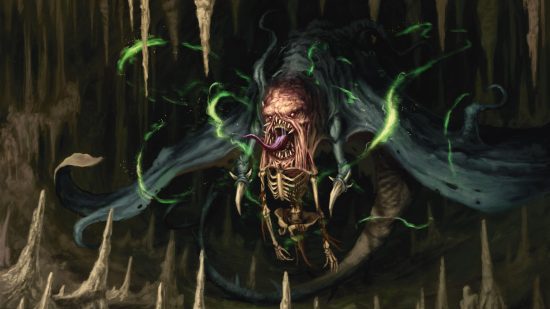
Despite these teething problems, Phandelver and Below does a lot right. It balances classic D&D tropes with creative surprises excellently – yes, there are Mind Flayers, but not as we know them. Almost every recognizable monster you meet has a secret twist, and the new creatures introduced are unique in the most horrible ways possible.
From chapter five onwards, Phandelver and Below is a gradual decline into insanity. It plays upon the D&D community’s affection for Phandalin, dangling the idyllic setting and its wholesome inhabitants on a thread and leading you further into darkness. The writing is atmospheric, the encounters are varied, and the details that embellish every corner are excellent.
NPCs with adorable, horrifying, or hor-dorable traits make a mundane place feel memorable. Story-driven mechanics give combat encounters a new spin. And the second half of the story is tied together neatly with mechanics that prove the severity of the situation to your players – and adjust the difficulty of the final fight depending on their actions earlier on.
Not everything is perfect, of course. There are times when design choices feel a little too severe (although that is in keeping with the horror feel). But mostly, with the core mechanics of the campaign working like a well-oiled machine and creative embellishments on every corner, the new content in Phandelver comes together with a flourish. A grisly, gruesome flourish.
